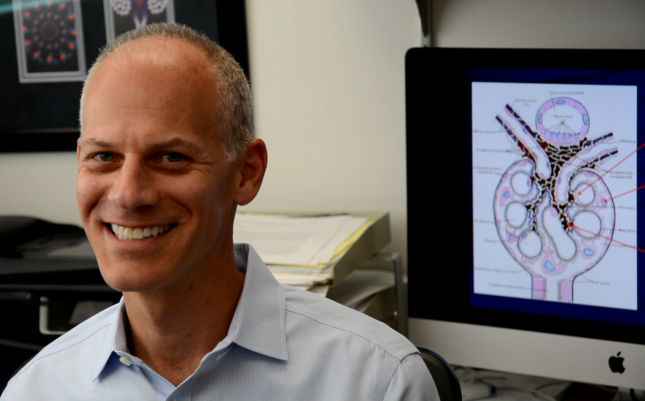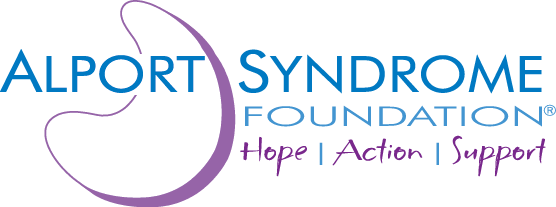
Jeffrey Miner, PhD, FASN, Eduardo and Judith Slatopolsky Professor of Medicine and Director of Basic Research in the Division of Nephrology at Washington University in St. Louis, has been awarded a five-year, $2.25M R01 grant from the National Institute of Diabetes and Digestive and Kidney Diseases (NIDDK) to study Alport syndrome. An R01 is the mainstay research grant awarded by the National Institutes of Health (NIH) and is given to fund projects backed by strong preliminary data and judged as likely to have significant impact on advancing the field.
Dr. Miner is an internationally recognized expert on Alport syndrome, an inherited disease characterized by progressive decline in kidney function, hearing loss, and eye abnormalities. The disease is caused by genetic mutations that affect the expression or function of the type IV collagen a345 family of proteins in the basement membranes of affected organs.
Because it affects less than 200,000 people in the United States, Alport syndrome is considered to be a rare disease. Currently, there is no FDA-approved therapy for Alport syndrome.
The Miner Lab studies the composition and function of the glomerular basement membrane (GBM), a specialized extracellular matrix that is an integral component of the kidney’s filtration barrier. A major component of the GBM is the type IV collagen a345 protein network that is defective in Alport syndrome. The proteins are synthesized exclusively by podocytes, a specialized cell of the kidney’s filter. The lack of this form of collagen IV causes structural GBM abnormalities and secondary damage to the glomerulus, stemming from many changes in gene activity.
The goal of the newly awarded grant is to either restore the Alport GBM to a more normal composition or alter its composition through the removal of pathogenic components and addition of therapeutic components. This will be accomplished using innovative, state-of-the-art technologies that involve small molecule, CRISPR, and protein biochemistry approaches in mouse models of Alport syndrome.
“The expectation is that improving GBM composition will at least partially normalize GBM structure and function,” says Miner. “Together with renin-angiotensin system blockade as a standard of care, these treatments could greatly delay the time to end-stage kidney disease and be beneficial when translated to patients.”
Alport Syndrome Foundation (ASF) is the leading independent, nonprofit organization in the United States that gives a voice to the Alport syndrome community. ASF’s mission is to improve the lives of patients through education, empowerment, advocacy, and investment in research. Additionally, ASF provides educational resources to medical professionals and researchers. Its board of directors and staff all have personal connections to Alport syndrome as patients, caregivers, family members, and/or friends of affected individuals.

The Foundation directs the majority of its resources to research-related activities and patient education. Since it was established in 2010, ASF’s Research Program has invested nearly $2M in research projects around the world including the United States, Canada, Europe, Japan, and Australia. ASF’s vision is to find new treatments and a cure to prevent kidney failure and hearing loss in all patients with the disease.
“This grant will allow Dr. Miner and his lab to study the fundamental workings of the molecular pathways involved in Alport syndrome (AS) along with the timing of AS expression using a variety of mice that mimic certain AS variants in humans,” says André Weinstock, PhD, MSAS, who is the Volunteer Chair of ASF’s Research Program and a member of ASF’s Board of Directors. “A potential practical application of this research could be the chance to learn whether molecules called eukaryotic ribosomal selective glycosides (ESRGs) can override mutations known as ‘nonsense’ mutations and, in turn, possibly act as a curative therapy for AS. For context, about 6% of AS patients have a nonsense mutation. In combination with funding from the ASF, this portion of Dr. Miner’s research will also study how late a potential therapeutic ‘rescue’ can happen in the course of AS progression. Insight from this research might proactively address challenges with other curative gene therapy approaches for AS.”
Miner has a long-standing relationship with Alport Syndrome Foundation and is a member of its Scientific Advisory Research Network, a group of international Alport syndrome researchers who collaborate and provide expert guidance on how to best achieve targeted research objectives. In early 2021, Miner received ASF funding to study the usefulness of CRISPR as a gene therapy treatment for Alport syndrome. Read more about the study here.
“The funding I have received from ASF over the years, as well as the increased recognition and visibility for Alport syndrome that ASF has instilled in the nephrology clinical and research communities, were instrumental in my being able to obtain this new grant,” says Miner.
Follow @JeffMinerPhD and @AlportSyndFndn on Twitter and keep up to date with the Washington University in St. Louis Division of Nephrology at @WUNephrology and nephrology.wustl.edu. Learn more about ASF on their official website.